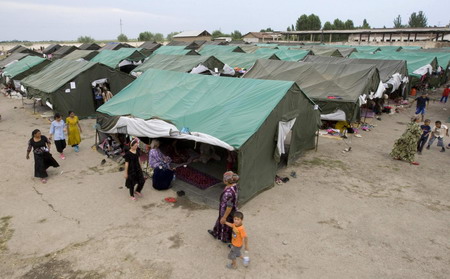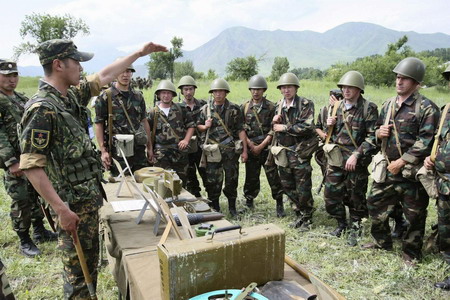Asia-Pacific
UN says 400,000 uprooted in Kyrgyzstan
(Agencies)
Updated: 2010-06-18 10:42
 |
Large Medium Small |
|
|
Ethnic Uzbeks in camps along the Uzbekistan side of the border told Associated Press reporters Thursday that they were fearful of returning to their homes. Many on the Kyrgyzstan side said they had been prevented from doing so by the authorities, and were awaiting their chance to leave the country for the camps.
A few parts of the south have been all but purged of the ethnic Uzbeks. In other areas, some residents, mostly men, had stayed behind to look after property still left, felling trees and piling up old cars on the streets to barricade themselves into their neighborhoods.
"My house is not there anymore, it is burnt down, said Khafiza Eiganberdiyeva, 87, who is among 20,000 refugees in a camp set up near Yor Kishlok, three miles (five kilometers) from the Uzbek-Kyrgyz border.
In an Uzbek neighborhood of Osh, a baker who had fled to the border with his wife and five children said his family had lost hope after supplies on the border ran out, and returned out of desperation.
"Is there any difference where to die? There is no food, no water, no humanitarian aid," Melis Kamilov, 36, said against the backdrop of his ruined home.
The Kamilovs fled to the border on Sunday, three days after the rioting began in earnest.
"I am an Uzbek, is that a crime? This is not a Kyrgyz house, this house is mine."
More than 1 million Uzbeks who lived in Kyrgyzstan before the crisis had few representatives in power and pushed for broader political and cultural rights. About 800,000 of them resided in the south, rivaling Kyrgyz in numbers in the southern cities of Osh and the nearby town of Jalal-Abad. Both are predominantly Sunni Muslim.
Kyrgyzstan's weak military has been gradually regaining control of Osh, a major transit point for Afghan heroin and the epicenter of the recent violence, but citizens reported that some soldiers also were looting food aid. Some refugees who deserted Jalal-Abad, which also suffered heavy damage in the rioting, have been stopped from returning there by authorities who set up a checkpoint on the road back into the city.
|
|
In Britain, media reports said one of Bakiyev's sons had sought political asylum.
Maxim Bakiyev fled to Britain after Kyrgyz prosecutors put him on a wanted listed for allegedly avoiding almost $80 million in taxes.
The Home Office says the 32-year-old was questioned by officials when he flew into Farnborough Airport near London on a private plane Sunday without the necessary documents to enter the U.K.
Britain's domestic news agency Press Association reports that Bakiyev is seeking asylum. The Home Office said it cannot comment on an ongoing asylum application.






